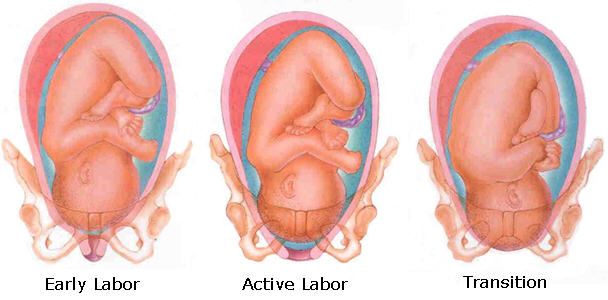During labor and delivery, things might be slow until it’s time for pushing. Birth crowning, which is the term for the moment the baby’s head begins to come out, happens during the pushing phase. If you keep pushing, birth crowning will happen which means that your baby is almost there!

Pushing and Crowning During the Second Stage of Labor
When it comes to labor, many women worry about pushing. Birth crowning, however, must have pushing in order to happen. Once you get into the pushing phase, you might actually be very relieved to finally have something to do.
Stages of Labor
There are actually three stages of labor. The first is the onset of labor, which begins with very mild contractions–some women don’t even feel them!–and progresses to hard labor, which dilates the cervix to 10 centimeters. At that point, it is time to start pushing.
The pushing phase is the second stage of labor. This is the point where you will start pushing, birth crowning will begin, and soon you will push your baby out into the world. Pushing comes naturally to some women; to others, it doesn’t.
The third phase is the delivery of the placenta. Compared to the other phases, this should be very easy. It usually takes a few contractions and a few mild pushes, then it’s done.
Pushing and Crowning
At the second stage, you will want to push. Your body will naturally take over, and the urge will be so strong that you might not be able to stop pushing. Birth crowning will happen when your baby is down low enough to be pushed out by your efforts. Expect to feel strong pressure as your baby presses down. You might have to stop pushing when your doctor tells you to in order to keep this stage from going too fast and tearing you.
How to Push
As your contractions build, you will feel the urge to push. Try to relax as much as you can, take a deep breath, and then push as though you were trying very hard to have a bowel movement. Push with your abdominal muscles. Push every five to six seconds until you are told to stop or until the urge goes away. Remember that when you are pushing, birth crowning will begin to happen–and it might be a burning, stinging sensation. This is perfectly normal.
Positions for Pushing
The traditional pushing position is on your back, legs in stirrups, pushing toward the end of the bed; however, this is no longer considered the best thing for all women. You can choose to squat down over a bed, stand up and push, or even lying on your side. Whatever position works best for you is what you should use when it is time to push.
Tips for Pushing
Pushing is hard physical work. When it’s time to push, take your time to figure out how to do it–remember that it might not come naturally to you. Don’t strain to push your baby out, but rather provide strong and steady pressure with each contraction. Make noise if you need to; remember this is hard work!
Let your labor companion or nurse help you figure out the best positions for you. They might also be able to help you breathe properly to push more effectively. When you are pushing, birth crowning might make you want to stop; that’s when you can reach down and touch your baby’s head, to give you the mental and emotional fortitude to keep going.
How to Prepare for Delivery
Many women are afraid of what will happen during pushing and birth crowning. The baby’s head coming through can feel like a stinging, burning pain that might take a woman by surprise. However, knowing what will happen can help, as can a few ways to deal with it.
To prepare, engage in perineal massage in the days and weeks leading up to birth. The perineum is the bit of skin between your vagina and your anus. This skin will stretch to allow the baby to come through. The more you massage it, the more flexible it will become, and you might be able to prevent tearing, or make the burning sensation easier to handle. Massage this area for ten minutes each day, starting at 35 weeks or so.
When you are in labor, place warm or hot cloths on the perineum to loosen up the skin and relax it. This can help you keep from tearing during birth crowning.
